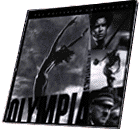

Germany sports
1939
bw 200 min.
Director: Leni Riefenstahl
CLV: $99.95 - available
2 discs, catalog # CC1489L
In the epic prologue to Olympia, we are taken through swirling clouds to a world of
classical temples. A statue comes alive and in a sequence of haunting beauty, male athletes
and naked female dancers demonstrate the power and grace of the human body. The Olympic
flame is lit; culture and history, physical beauty and prowess are all combined. The effect
is extraordinary.
But when 33-year-old Leni Riefenstahl agreed to direct a film about the
1936 Berlin Olympic Games, there was no history of Olympic filmmaking to look back on.
There had been little more than newsreels of the early Games. The fact that the first Olympic
film should also be the greatest is a measure of Riefenstahl¹s achievement.
When the Nazis came to power, Hitler decided to make the Olympic Games of 1936 into a propaganda
spectacle to promote the Third Reich to the world. Riefenstahl had already directed two films
at another gigantic Nazi propaganda setpiece, the annual Nuremberg rally. Her film of the 1934
rally, Triumph of the Will, is the most powerful evocation of the fascist ethic ever
made on film. Riefenstahl herself was never a member of the Nazi Party. She always claimed that
she was not a political person. But the purpose of her films was supremely political: to represent
a deeply evil regime in a positive, healthy way. After the success of Triumph of the Will,
Riefenstahl was asked to make a film of the Olympics, to capture the magnificence of the stadium and the ceremonies, and also to record a vital aspect of Nazi ideology‹the supremacy of the Aryan race. Victories by German athletes would be a perfect climax for the Nazi Games.
Riefenstahl's Olympia does more than simply record the spectacle of perhaps the greatest Games to
date; it becomes a hymn to physical prowess. The outstanding athlete of the Games was
unquestionably Jesse Owens, the black sprinter from Alabama. His four gold medals in track and field
were unmatched for fifty years. Riefenstahl almost fell in love with him. Her cameras catch his
body, coiled like a spring, waiting to unwind. Hitler's dream of Aryan supremacy on the track
crumbled with Owens, but despite some opposition from Propaganda Minister Dr. Joseph Goebbels,
the film features each one of his superb gold medal wins.
Riefenstahl's cinematic imagination is ever present in Olympia. The camera angles alongside
the track, the slow-motion effects, the use of telephoto lenses to capture triumph and pain on
the faces of the athletes, have now become part of the grammar of sports filmmaking. In Berlin
they were often being tried for the first time. And in the editing, Riefenstahl is equally
pioneering. The women's high jump is transformed into a cinematic ballet. Following this is
unedited drama in a single panning shot of the men's 400 meters, one lap of the track.
The marathon is almost a film within a film, a 14-minute account of endurance. Point-of-view
shots from the runners take us into the race itself; the pounding rhythm of Herbert Windt's
music adds a relentless momentum.
More than once, Riefenstahl restaged events when she did not
have what she wanted. The dramatic finish to the pole vault went on beyond dusk and she was not
allowed to set up arc lights to film it. So, she staged it again, with lights, the next evening.
Coverage of the diving, swimming, rowing, and yachting events all include shots that were taken
in the warm-ups beforehand, or after the event was over.
Riefenstahl and her team of some 200 cameramen and technicians shot about 250 hours of film.
Riefenstahl edited this over a period of 19 months into a two-part film of approximately
3 and 1/2 hours. Recording the music and mixing the sound took three months.
In glorifying
the Nazi Olympics, Riefenstahl¹s Olympia will always, rightly, be seen
as a political film. But Olympia is more than this, it is an artistic celebration of
physical beauty and athletic prowess -- and a great contribution to the history of film.
-- Taylor Downing
Taylor Downing is a writer and documentary producer who has filmed two Olympic Games:
Seoul in 1988 and Barcelona in 1992. His book Olympia, on Riefenstahl's masterpiece,
is published by the British Film Institute.
Transfer
Olympia is presented in its original theatrical aspect ratio of 1.33:1. This new digital
transfer was created from original 35mm elements under the supervision of director Leni Riefenstahl.
The original optical track mono audio was painstakingly improved by Michael W. Wiese.
Index of Films


Buy CLV |
View Items |
Checkout
Ordering Information |
Criterion |
Home Vision
|
|
|




